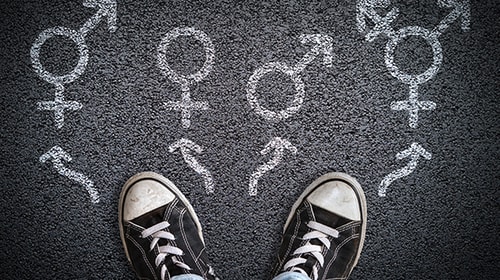Barely a day seems to go by without a transgender news story. From the bathroom wars in the US, to arguments about sporting rules based on gender, from disagreements about school uniform policies, to advice from the British Medical Association to use the phrase ‘pregnant people’ in place of expectant mothers.
In the midst of all this, the Scottish Government has consulted on proposals to change the Gender Recognition Act, to allow people to self-identify when it comes to gender. The current law requires someone to have lived successfully for at least two years whilst presenting themselves as their chosen gender. But, a parliamentary committee at Westminster has called for significant changes, including moving to self-identification and lowering the age limit to 16 years old.
Potential reform of gender recognition law has been met with strong criticism from feminists, who see the proposal as an attempt to do away with all references to the biological female sex. Writer and academic Germaine Greer, for instance, argues that biological women are “losing out everywhere”. She adds, “I’m sick and tired of this. We keep arguing that women have won everything they need to win. They haven’t even won the right to exist.“1
More than a debate
There is a great deal of cultural confusion around transgender, and information and opinions are constantly changing. But, transgender is not simply an issue to be debated; it raises fundamental identity questions for people who, like all of us, need to be loved.
Gender dysphoria is a relatively rare medical condition, where a person experiences significant discomfort or distress due to a mismatch between their gender and sex. (There are approximately 15,000 gender identity patients in the UK.) However, there is a much wider transgender movement, where one does not need to experience dysphoria or have any intention of permanently transitioning to call oneself trans. The movement is heavily influenced by established theories and ideologies about sexuality and gender.
Problems in the church can arise when people try to respond pastorally to ideological arguments, or respond theologically, and in the abstract, to a person standing in front of them who needs a pastoral response. In preparing two new resources to help the church respond to transgender, the Evangelical Alliance heard from groups that stressed their hope that the church would be a place of welcome, even if it did not know how to respond to all the questions being asked of it. A participant of a transgender support group commented, “If you have met one transgender person, you have met one transgender person; no two experiences are the same.“
Our response
Christians have too often been on the back foot and slow to respond to the social changes concerning gender and gender dysphoria. It is hoped these resources will help individuals and gathered communities to understand, love and relate to transgender people and the wider movement. Like our Lord’s, our love is to know no boundaries, even if we don’t agree with someone else’s beliefs or stance.
The church is to respond with compassion. The church should be, and often is, a place of welcome for everyone, and in particular those who feel marginalised. Let’s listen to the stories of those wrestling with gender dysphoria to understand them. The condition itself is often painful and distressing, and those who experience it have disproportionately high levels of mental health problems. However, this does not negate the church’s role in discipling someone who struggles with gender dysphoria on what can be a long and difficult journey in reconciling their experience with their body.
The second issue for the church is clarity in this difficult area. There are complexities and confusion around transgender, and the church is encouraged to recognise its own limitations while remaining faithful to the biblical text. The Bible may have limited references that touch directly on trans identity, but it has much to say about what it is to be human, about sex and gender, about the body, and about life in a fallen world.
Redemption, through life in Jesus Christ, brings hope for our hearts, mind and bodies, all of which have been affected by the fall. Let us, therefore, also be careful in responding pastorally to individuals, whilst recognising the more troubling elements of the underlying movement.
Finally, the church should, with humility, give voice to some of the concerns it has. The church, like many others, is concerned at the rush to invasive and non-reversible medication and procedures, particularly in children. The church also sympathises with the concerns being raised by many women’s groups about the safety of women, for example, in women’s refuges, but more fundamentally, that their very identity is being challenged.
There is always a danger of being misheard and so we are to build good relationships and ensure we speak with the right tone. We believe this resource will help enable more compassionate encounters.



